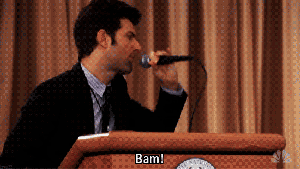If you practice domestic discipline then you’ve probably heard of the four D’s:
Diseased, Dying, Disabled, and Dead.

Sorry, wrong notes.
The four D’s of domestic discipline are : Dishonesty, Disobedience, Dangerous (behavior), and Disrespect. These are often presented as the first and simplest guidelines that should be adopted for the submissive partner’s behavior. The reason is sound: for the most part they are simple, straightforward, and to a certain extent should be a part of any relationship–DD, vanilla, or otherwise.
Let’s talk about what they mean in a DD relationship.
Dishonesty
Don’t lie. It’s that easy.

But wait, Mr. Knave! I hear you cry. I never lied. I just didn’t mention something. To which I reply: Prevaricator! Dissembler! Shame! You filthy, lying, perfidious, fib-beast!

No, wait, don’t go. I forgive you. Lying isn’t just the deliberate speaking of a falsehood, it is any behavior that either intentionally misleads someone or even allows them to be misled. Lying by speaking a falsehood, lying by omission, lying by implication, and lying to oneself are all just different kinds of dishonesty and all of them are equally destructive.
Dishonesty is toxic and insidious. If unchecked it will spread its greasy tendrils all throughout a relationship, it will drain it of all the trust and love that relationship is built on, and it will leave nothing but a husk behind. This is as true for a vanilla relationship as it is for any other kind of relationship.
But what about little white lies? the more tenderhearted amongst you ask. Fair question. I sincerely believe that absolute honesty is the best policy. If your husband/wife asks, “Does this make me look fat?” I feel like you should give an honest answer.

There is a way to do this tactfully, of course, but inevitably feelings will be bruised, I know. I maintain that it is still the best policy, though perhaps not one that can be introduced to a long established relationship without a great deal of difficulty.
Why are you trying to sabotage my relationship? you ask. I’m not, I promise. I believe that the closer we are to someone, the more we owe it to them to be honest. I’m not suggesting you proclaim, “My god, you look huuuuuuuuuge!” the moment your partner walks into the room. Don’t be unkind and don’t be rude, but if they ask for an opinion you should be honest. Why? Because other people that don’t care for your partner will be honest. They will be unkind and they will be rude. They will be cruel. Very often a white lie is just as much about protecting yourself from unpleasantness as it is about sparing your partner from hurt feelings. That is selfish and, in domestic discipline in particular, it has no place.
Most of this applies to all relationships, but there is one particular aspect of dishonesty that warrants special attention in a domestic discipline relationship. Because the submissive person has guidelines that govern behavior and because the person in charge isn’t omniscient there will inevitably be times where those guidelines are broken without the Head of Household’s (HoH) knowledge. Is it dishonest for the submissive to neglect to mention those infractions?
Of course it is.
DD is a mutual agreement between partners. If either person doesn’t want to participate it should cease, full stop. Otherwise, both people should act in good faith. If the submissive breaks a rule he or she should own up to it and allow the HoH to decide on the consequences. Very often the infraction is far less serious than a breach of trust–such as withholding something–would be.
Disobedience
You might think that in the context of a vanilla relationship this D doesn’t mean much. You’d be mistaken. Think about the last time you were in a relationship and both parties agreed to a certain course of action for a big decision–maybe it was buying a certain kind of car, or a particular course of action regarding how to handle a problem with a child, but whatever it was both people agreed to obey and abide by the decision. Now think about what would (or did) happen if one party violated that agreement.

The meaning of obedience in domestic discipline isn’t that different. Both parties agree to the general premise and the specific guidelines. The difference is that the consequences of violating those agreements are also agreed upon.
Obedience does not mean being a servant or a slave, and it does not mean the HoH should be barking orders at their partner. Disagreements are a natural, healthy part of a relationship and both partners should feel free to express their thoughts and opinions without fear of repercussion, so long as they are expressed politely and in a constructive way.

What it does mean is that after everything has been said one partner considers the options, makes the decision, and the other partner accedes without continued argument, dissent, or complaint. The measure of trust and faith that the submissive partner demonstrates through these actions is humbling, and the result is a more harmonious relationship. At times it means that the HoH will tell the submissive partner what, or how, to do or not do something–and because DD means that the HoH is always considering both the best interest of the relationship and the best interest of the submissive, the submissive will obey.
This seems very one-sided, the critics in the audience mutter. What about the HoH? Another fair question. The trust I mentioned above must be earned, and the submission must be granted. The HoH has a responsibility not only to act in the relationship’s best interest, but to hold himself (or herself) to an even higher standard than that which governs the submissive, or risk losing that trust along with the gift of submission his (or her) partner has bestowed.
To Be Continued
Good talk, loyal readers. I feel like we covered some real ground here. We talked about two out of four of the D’s, but confession time: these were easy ones. Next time we’ll look at Dangerous (behavior) and Disrespect, the latter of which can be difficult to define, and what all four of them mean to my Sweetheart and me. See you soon.
Good thoughts, and good for me to read. After all, my initial desires were for DD… and coming full circle, there’s no real reason why my goals can’t still be to embrace these qualities. Perhaps he’ll never bring to bear the consequences I’d relate to best, however it most definitely would be most loving to not observe my part in the equation of submission.
LikeLike